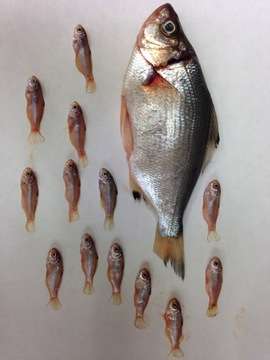Biologists give paternity tests to fish (Update)

(Phys.org) —Paternity tests of surfperch fishes reveal that a single brood may have as many as eight different fathers. And the more mates a female surfperch has, the more offspring she will produce, according to a new report from SF State scientists.
For researchers who study these California coastal fishes, the findings may explain why female surfperch—which are expected to be choosy about their reproductive partners—mate with so many males.
This research also sheds light on a contentious idea in biology, which is based on the supposition that females of a species tend to invest much more time and energy in their offspring compared with males. The theory suggests that males benefit from mating with more females by siring more offspring, but the reverse is not true for females.
Data collected by the SF State scientists, show for the first time in surfperches, that females who mate with increasingly higher numbers of males produce more offspring than females that mate with fewer males.
Unlike most fishes that spawn hundreds to thousands of eggs, surfperches give birth to relatively few live offspring that are born almost fully mature, says Karen Crow, the SF State associate professor of biology who led the new study. But even with the significant investment required to grow and carry a nearly full-grown juvenile before birth, female surfperches improve their reproductive success by mating with multiple males.
When Crow and her colleagues collected pregnant females from two surfperch species, from the shorelines near Pacifica, Calif., they used genetic markers to reveal that each female's brood had multiple fathers. Spotfin surfperch had an average of two to seven fathers per brood, while shiner surfperch had one to eight fathers per brood.
The researchers determined paternity in much the same way that human paternity can be tested, by comparing tiny repeating patterns in DNA called microsatellites. These patterns are molecular markers that are passed on from parents to offspring.
How does multiple mating benefit female surfperches? Crow and her team believe that the unusual reproductive cycle of these fishes allow females to be choosy—just not in the ways that biologists have expected.
Previous research has shown that female surfperch fish can store sperm within the uterus for up to five months. By storing the sperm from multiple males, the females may be able to "choose" when and with which sperm they want to fertilize their eggs. This strategy may set up a kind of competition between sperm from different potential fathers, so that only the best sperm contribute to the next generation. Or it may optimize the genetic diversity within broods, helping the offspring to thrive in varying environmental conditions.
The study "Multiple paternity is a shared reproductive strategy in the live-bearing surfperches (Embiotocidae) that may be associated with female fitness" by SF State undergraduate student John R. LaBrecque; postdoctoral fellow Yvette R. Alva-Campbell; SF State graduate student Sophie Archambeault; and Karen D. Crow was published in the most recent issue of the journal Ecology and Evolution.
Publication details
LaBrecque, J. R., Alva-Campbell, Y. R., Archambeault, S. and Crow, K. D. (2014), "Multiple paternity is a shared reproductive strategy in the live-bearing surfperches (Embiotocidae) that may be associated with female fitness." Ecology and Evolution. doi: 10.1002/ece3.1071
Journal information: Ecology and Evolution
Provided by San Francisco State University




















